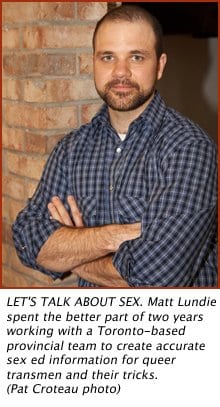If you can’t talk openly about who you are, you can’t talk about sex — understandably, one of the major obstacles in preventing the spread of HIV/AIDS in queer and trans communities.
Fully aware of the connection between dialogue and prevention, Ottawa-based trans activist Matt Lundie has volunteered a good chunk of his spare time over the last two years. He contributed to a provincial working group of the AIDS Bureau of Ontario that’s focused on HIV prevention amongst queer transmen.
“If you’re uncomfortable using words to describe yourself and your body parts, then how do you negotiate with a partner?” asks Lundie. “Self-esteem and being comfortable with expressing yourself is a huge part of HIV prevention — it’s not simply about having condoms and the desire to use them.”
So far, the major accomplishment of the 10-person working group is in producing a sex-positive and comprehensive sexual health guide. It’s by and for transmen and “the men who dig them.” The first of its kind, the 32-page guide is called Primed, and all 5000 copies from its first printing have been scooped up since it was released in May 2007. In fact, backorders are piling up.
There have been a few bumps along the way, most notably in Ottawa, where the Village-area Centretown Community Health Centre does not publicly display the Primed guide (or any other frank sexual health literature) in its resource area. The booklet has to be requested from the centre’s staff.
“A big part of this is that the Centretown Community Health Centre doesn’t make sexual health resources readily available to the public,” says Lundie. “I don’t personally think that it has anything to do with it being a transmen’s guide. But if it’s not available in your community healthcare centre, then where are you going to get it?”
For a variety of reasons, sexual health information can be hard to come by — even more so when it addresses marginalized groups. That’s why Primed is meeting a need — providing information not only to transmen and their sexual partners, but also to service providers who want guidance on how to sensitively and effectively serve trans clients.
“Within AIDS service organizations, there’s more and more of a recognition that queer transmen are coming out and getting active in the gay men’s community,” says Lundie. “But there’s not really any programming that addresses the unique needs of transmen. Getting something out there that says we exist is a big step.”
“The idea was to help open up communication between people by using a language that is as inclusive and as clear as possible. We also wanted to make sure it was sex-positive and to use terms that are relevant, like ‘fuck’ or ‘blow job’ or whatever the case may be.”
As a first step in getting information out there, this guide is shedding light on a number of key sexual health issues and creating needed dialogue related to the overlap between queer and trans communities.
“There were a lot of recurring themes within the surveys, such as the challenges that transmen feel when they’re engaging with non-trans men,” says Lundie. “Disclosure is a big challenge for a lot of people because if you’re not visibly trans, at what point do you make that leap to let someone know that there may be a few things about you that are not generally encountered in the gay community? Safety is still an issue in terms of whether or not you’ll be accepted.”
As the only member of the working group living in the Ottawa area (the other members are all based in Toronto), Lundie’s personal mission is to use the guide as a building block for connecting with a broader peer network of transmen in this area, as well as educating local service providers so that they can create relevant services for transmen.
Meanwhile, a French-language version of Primed is due to come out before the end of this summer, and the working group is putting the finishing touches on a final report of the needs assessment that they conducted to develop the Primed guide. A related training package for service organizations is also in the works.

 Why you can trust Xtra
Why you can trust Xtra


